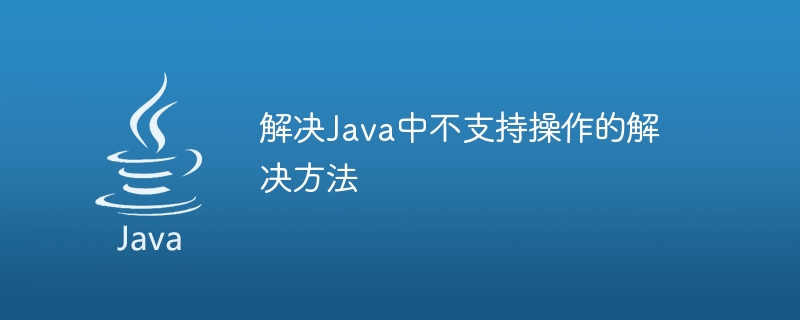Home >Java >javaTutorial >Solution to unsupported operations in Java
Solution to unsupported operations in Java
- 王林Original
- 2023-08-26 13:27:29903browse

Solutions to solving unsupported operations in Java
In Java development, we often encounter some unsupported operations, which may be due to the language itself restrictions or specific requirements. Fortunately, Java provides some workarounds to handle these situations, and this article will introduce some common unsupported operations and their solutions.
- Customized exception handling
Some operations may cause unsupported exceptions. In this case, we can customize the exception handling method. The following is an example that demonstrates how to handle unsupported operation exceptions.
try {
// 执行可能引发不支持的操作的代码
} catch (UnsupportedOperationException e) {
// 对不支持的操作进行处理
System.out.println("不支持的操作");
e.printStackTrace();
}In this example, we use a try-catch block to catch exceptions that may be thrown, and handle unsupported operations in the catch block. We can customize exception handling code according to actual needs.
- Using the Adapter Pattern
The Adapter pattern is a common solution in design patterns, which can be used to solve unsupported operations in Java. The Adapter pattern enables incompatible classes to work together by converting interfaces. Below is an example that shows how to use the adapter pattern to resolve unsupported operations in Java.
public interface Target {
void doSomething();
}
public class Adaptee {
public void doSomethingElse() {
// 进行不支持的操作
}
}
public class Adapter implements Target {
private Adaptee adaptee;
public Adapter(Adaptee adaptee) {
this.adaptee = adaptee;
}
public void doSomething() {
adaptee.doSomethingElse();
}
}
// 使用适配器
Target target = new Adapter(new Adaptee());
target.doSomething();In this example, we define a Target interface and a Adaptee class. There is a different class in the Adaptee class. Supported operations doSomethingElse(). Then, we define an adapter Adapter, which implements the Target interface, and calls Adaptee in the doSomething() method ##doSomethingElse()Method. This way we can use the adapter to call unsupported operations.
- Using proxy mode
- Proxy mode is another common way to solve unsupported operations in Java. The proxy pattern is accomplished by providing a proxy object that delegates unsupported operations to other objects. Below is an example that demonstrates how to use proxy pattern to resolve unsupported operations in Java.
public interface Subject {
void doSomething();
}
public class RealSubject implements Subject {
public void doSomething() {
// 执行不支持的操作
}
}
public class Proxy implements Subject {
private Subject realSubject;
public Proxy(Subject realSubject) {
this.realSubject = realSubject;
}
public void doSomething() {
realSubject.doSomething();
}
}
// 使用代理
Subject subject = new Proxy(new RealSubject());
subject.doSomething();Subject interface and a RealSubject class. The RealSubject class has an Supported operations doSomething(). Then, we define a proxy Proxy, which implements the Subject interface, and calls the RealSubject in the doSomething() method ##doSomething()Method. This way we can use proxies to invoke unsupported operations. Summary:
The above is the detailed content of Solution to unsupported operations in Java. For more information, please follow other related articles on the PHP Chinese website!

